 | Petar Nodilo, SJ Zagreb: We all were indeed happy to see how the Pope embraced our f. Petar Galauner, SJ, and how he was sincerely delighted to see him again. Our dear father Galauner, we wish you God's blessing so that you spend many years to come with us, with your confreres and with numerous flock which loves you. Petar Galauner, SJ, is distinguished educator, living in Croatia's capital Zagreb. His last encounter with Pope Francis was about thirty years ago. They first met in the Vatican in 1974. |
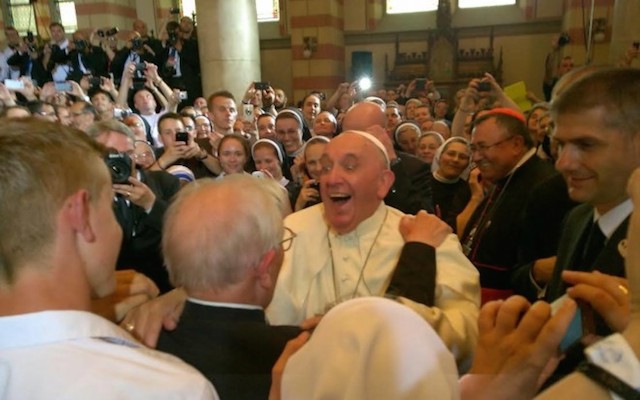
Pope Francis meeting f. Petar Galauner, SJ, in Sarajevo, 30 years after their last encounter. They first met in the Vatican in 1974.
From 14:45 onwards.
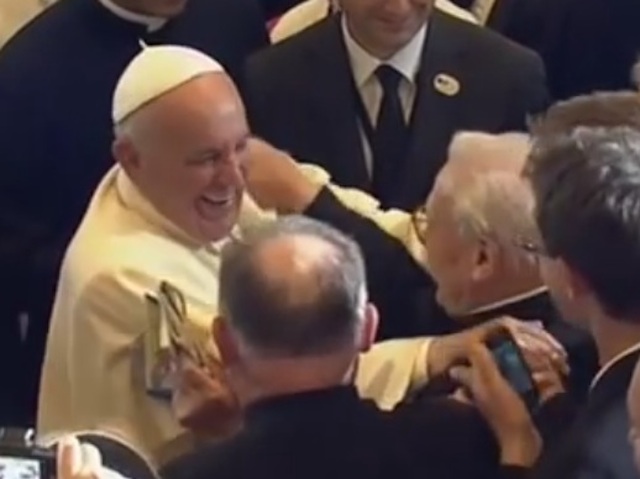
| Ako ste se pitali kome se to Papa toliko obradovao u sarajevskoj katedrali, odgovor je: našem dragom p. Petru Galauneru! Mi, hrvatski isusovci, ispratili smo patra Galaunera ovdje iz Palmotićeve u Zagrebu govoreći mu da nas svakako preporuči Papi znajući da se on već dugo poznaje s Franjom, još tamo otkad je Franjo bio ‘običan isusovac’. Naime, njih su dvojica istovremeno bili provincijali. Tada p. Bergoglio Argentinske provincije, a p. Galauner Hrvatske provincije Družbe Isusove. U tom svojstvu zajedno su sudjelovali na 32. generalnoj kongregaciji reda. Pater Galauner je ujedno i jedan od naših najznamenitijih isusovaca: bio je, naime, asistent našem velikanu, bivšem generalnom poglavaru reda – Pedru Arrupeu. Pater Galauner i dan-danas često spomene Arrupea i zahvali Bogu za milost što je nekoliko godina bio njegova desna ruka. (Svjedočanstvo Pedra Arrupea koji je preživio pad atomske bombe na Hirošimu možete vidjeti OVDJE.) No u svojem dugogodišnjem svećeničkom i redovničkom životu kojeg je ipak većim dijelom proživio u domovini, najviše ga pamte stotine i tisuće hrvatskih svećenika i intelektualaca koji su prošli četverogodišnje školovanje u gimnaziji “pod zvjezdarnicom”, odnosno u sjemeništu na zagrebačkoj Šalati. Dugo godina tamo je služio kao duhovnik i profesor njemačkog jezika, a 1990. godine preuzima službu ravnatelja Nadbiskupske klasične gimnazije koja tih godina dobiva pravo javnosti, koje joj je bilo uskraćeno pod komunističkim režimom. Također vrlo važno, p. Galauner je uz još neke patre 1998. osnovao i postavio na noge Isusovačku klasičnu gimnaziju u Osijeku. “U njoj se”, kaže moj subrat, isusovac Mislav Skelin, koji u gimnaziji radi, “i danas nakon više od petnaest godina događaju lijepe stvari i stvaraju lijepe životne priče”. Naš vrlo simpatični subrat još je uvijek vrlo aktivan iako je već u 86. godini. Godine ga ne priječe da svaki tjedan petkom navečer ispovijeda na misi mladih ovdje u bazilici Srca Isusova u Palmotićevoj ulici u Zagrebu sve do iza 22 sata, i to nakon što je već odradio nekoliko smijena ispovijedanja tijekom dana i primio na razgovore brojne ljude. Poznat je i po čudesnoj memoriji koja ga ni u ovim visokim godinama ne izdaje te on još uvijek pamti imena bezbrojnih đaka kojima je nekada bio ravnatelj. Pater Galauner je, šale se često s njim mlađi članovi zajednice, dugo godina u našoj zajednici obavljao službu koju je sada preuzela Google tražilica – ako netko nije znao neku informaciju, nazvao bi patra Galaunera i dobio odgovor. Jedina bitna razlika između Googlea i patra Galaunera, kaže dalje šala, je što su patrove informacije bile pouzdanije i točnije. Šalu na stranu, svi smo zaista bili sretni kad smo vidjeli kako je Papa zagrlio našega patra i iskreno mu se obradovao. Dragi naš pater Galauner, želimo ti Božji blagoslov tako da još puno godina budeš s nama u Palmi – i s nama tvojom subraćom i s brojnim narodom koji te rado ima. Petar Nodilo SJ | If you ever asked yourself who was the Pope the happiest to see in the Sarajevo cathedral, the answer is: our dear f. Petar Galauner! We, Croatian Jesuits, escorted father Galauner here from Palmotićeva street in Zagreb, asking him to recommend us to the Pope, knowing that he was familiar with Francis from long ago, from the time when Francis was an ‘ordinary Jesuit’. Namely, they were simultaneously provincials: f. Bergoglio of the Argentinean province, and f. Galauner of the Croatian province of the Society of Jesus. In this capacity they both participated at the 32nd General Congregation of the Order. Father Galauner is also one of our most famous Jesuits: namely, he was an assitant to our giant Pedro Arrupe, a former general provincial of the Order. Even today, f. Galauner often mentions Pedro Arrupe, and thanks God for the mercy that he was his right hand. (Testimony of Pedro Arrupe, who survived the explosion of the atomic bomb over Hiroshima, can be seen HERE.) However, during his priestly and religious life, which he spent mostly in his homeland, he was best remembered by hundreds and thousands of Croatian priests and intellectuals who attended four-year education in the gymnasium "Under the observatory", that is, in the seminary of the part of Zagreb called Šalata. During many years he served as a spiritual guide and professor of German language, and in 1990 he took over the service of the director of the Archbishop's Classical Gymnasium which in these years was granted the right of publicity, and which was forbidden during the communist regime. Also very important, in 1998 f. Galauner founded with his collaborators the Jesuit Classical Gymnasium in the town of Osijek. My Jesuit brother Mislav Skelin, who works in the Gymansium, says: "Even today, more than fifteen years after its founding, there are beautiful events and nice life stories that are being created." Our very beloved brother is still quite active even in his 86th year of age. His age does not prevent him to confess every friday in the evening during the mass for young people in the basilica of the Heart of Jesus in Palmotićeva street in Zagreb, even after 10 PM, and even after having had several turns of confessions and having received numerous people. He is known for his wonderful memory which serves him well even in his senior years, and he still remembers the names of inummerably many students that he used to guide. Petar Galauner, as younger members of the community tease him, has taken over the role of the Google searching machine - if somebody needed an information, he simply called father Galauner and obtained the answer. The essential difference between Google and father Galauner, continues the joke, is that the father's information was more reliable and more precise. Joking aside, we all were indeed happy to see how the Pope embraced our father and how he was sincerely delighted to see him again. Our dear father Galauner, we wish you God's blessing so that you spend many years to come with us, with your confreres and with numerous flock which loves you. Petar Nodilo, SJ |
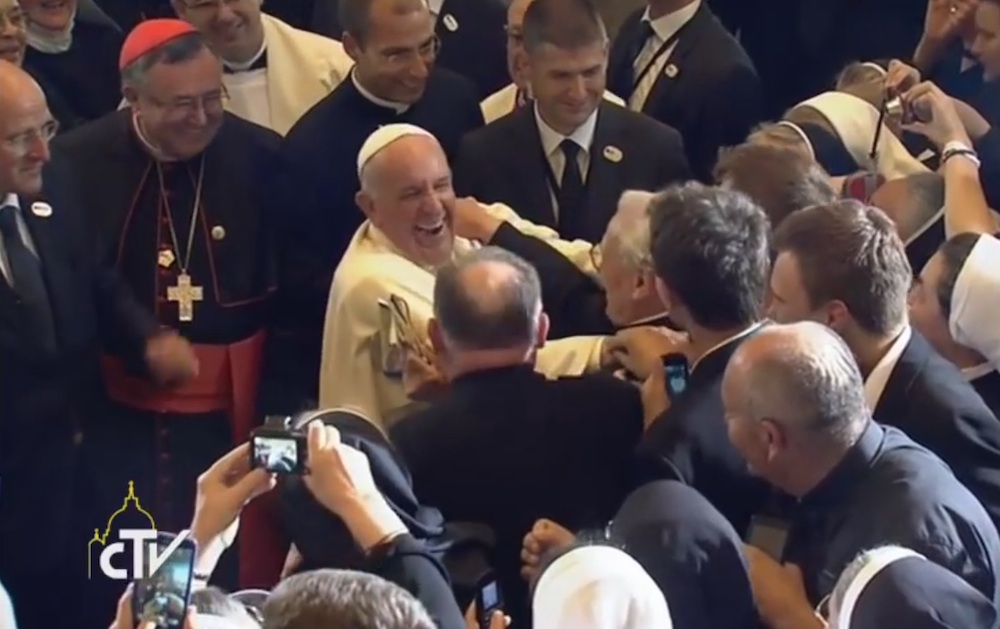
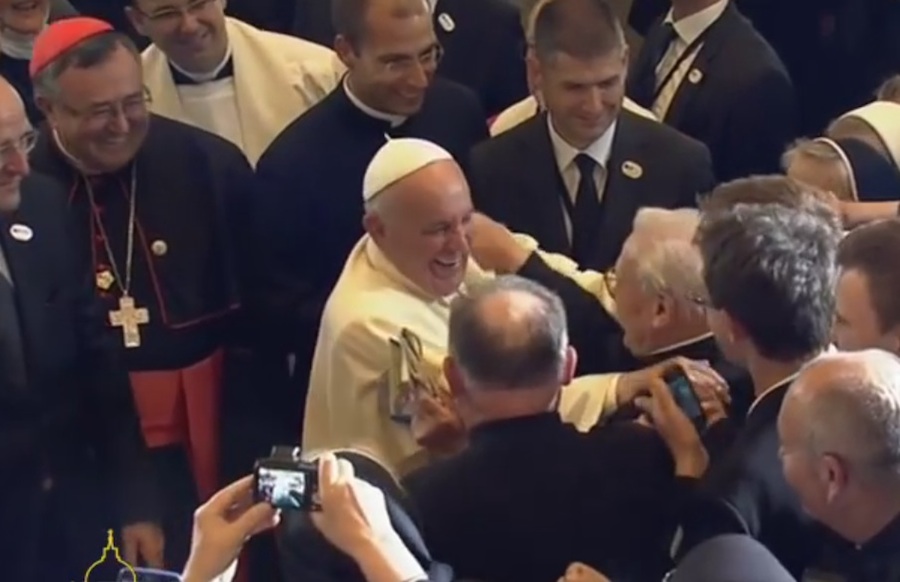
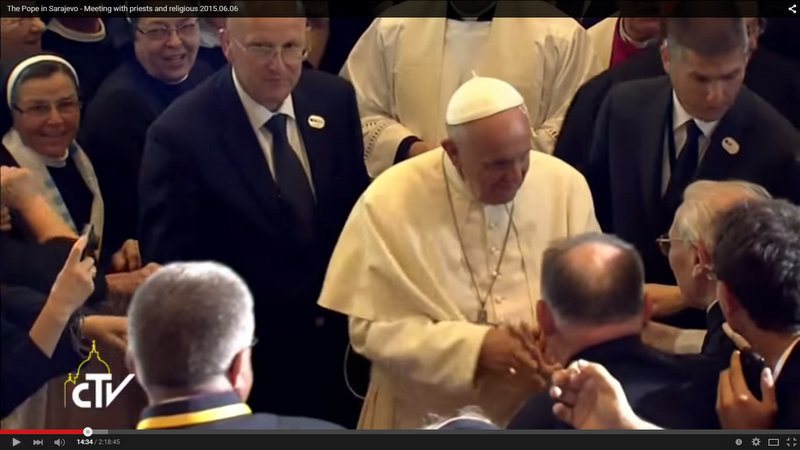
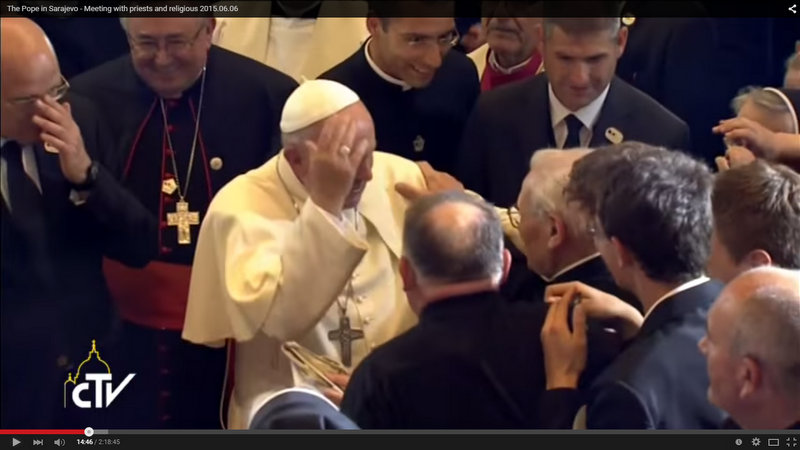
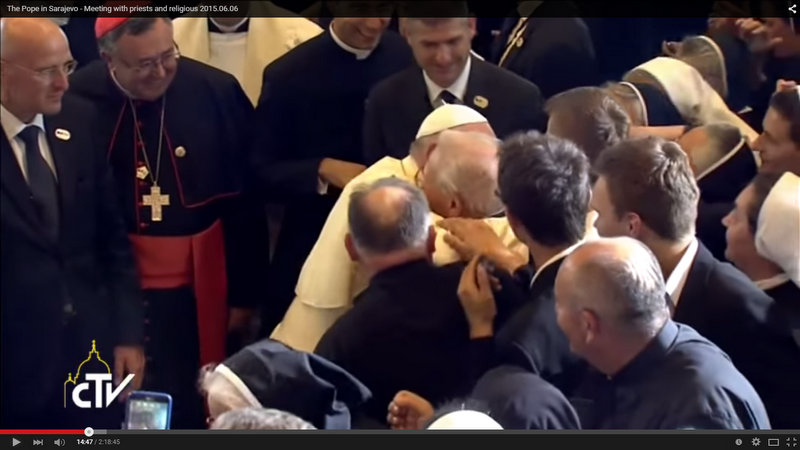
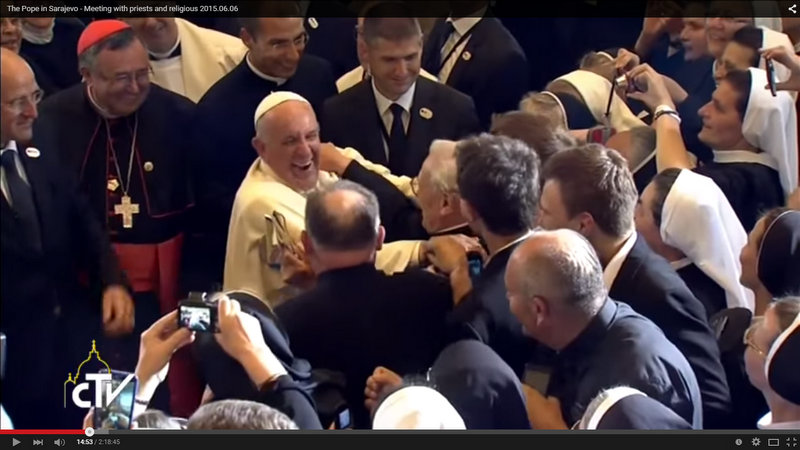
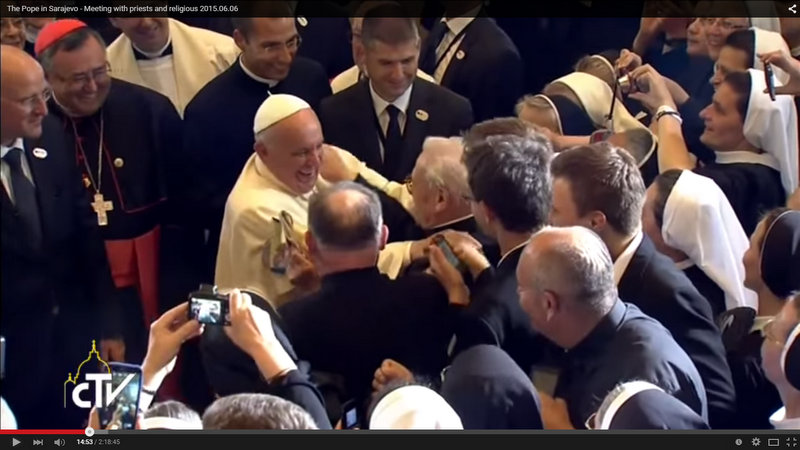
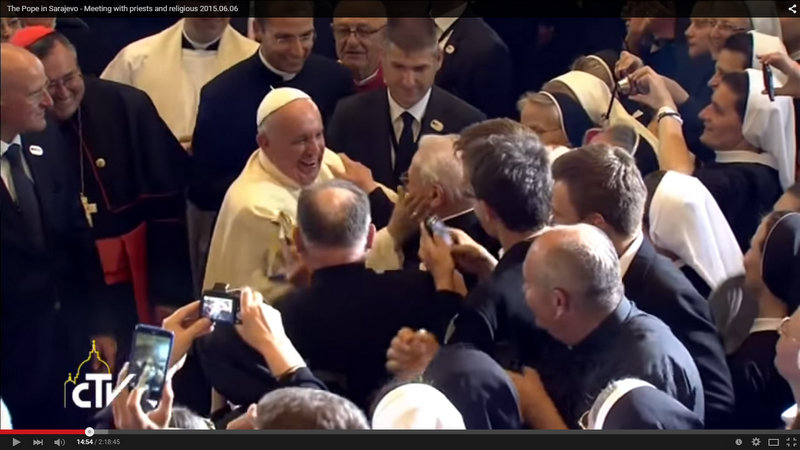
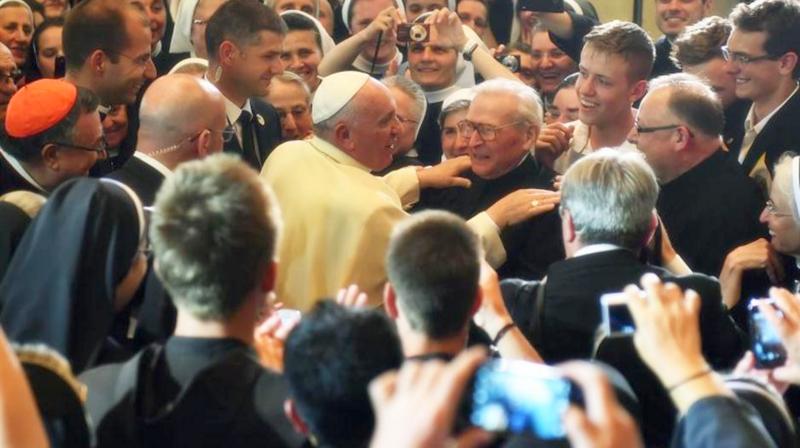
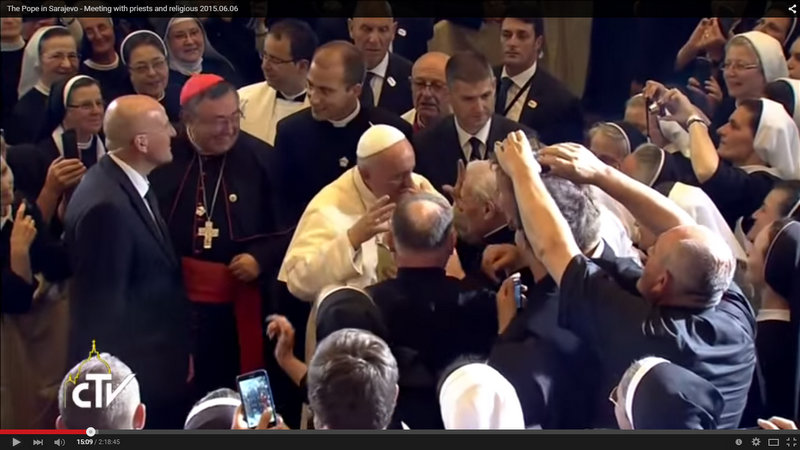
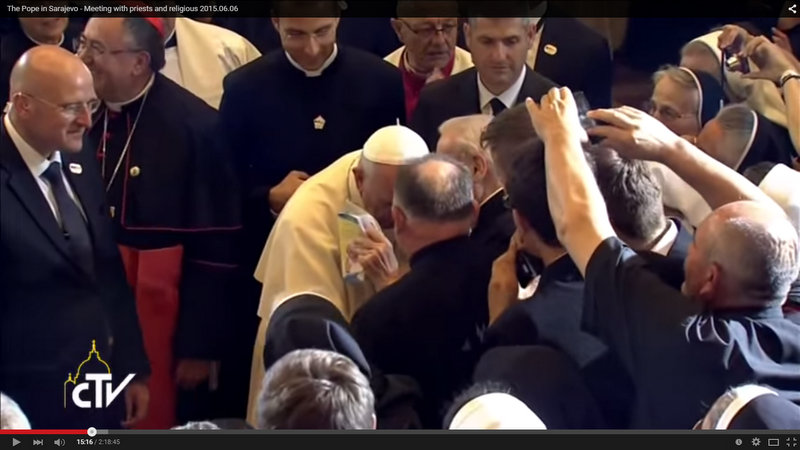
| Testimony of friar Jozo Puškarić before pope Francis In the Cathedral of the Sacred Heart in Sarajevo on June 6th 2015., during the meeting of the Holy Father pope Francis with the priests, monks and nuns, friar Jozo Puškarić testified: Our dear Holy Father, Pope Francis! I am immensely grateful to God that he gave me this blessed opportunity today to stand before you. Also I want to thank my Archbishop, His Eminence Cardinal Vinko Puljić, who chose me, in the presence of so many priests, religious men and women, to present in our cathedral my experience of the last war. Allow me to briefly introduce myself: I am Jozo Puškarić , Franciscan priest, member of the Franciscan Province of Bosna Srebrena. I was born in a large family - five brothers and four sisters - in the parish of Our Lady of Angels, Gornja Tramošnica. My native parish at that time was particularly rich with spiritual vocations. Therefore it's no surprise that my three sisters became members of Franciscan school sisters of Bosnian-Croatian Province. The war caught me in the office of the parish priest in the parish of Hrvatska Tišina near Bosanski Šamac, in the Bosnian Posavina region. Armed Serbian policemen came on May 14th 1992 into the parish house and took me to the camp, along with many of my parishioners, though we were not guilty of anything. The parish remained without inhabitants, and most of the houses were destroyed. In the 40th year of my life I spent four months in the camp. However, the time in the camp is not countable in months but rather in days, hours and seconds. The days were very long because they were filled with uncertainty and fear. 120 days seemed like 120 years or more. We were living in inhumane conditions! The whole time we were mostly hungry and thirsty; all those days and nights we lived without hygiene, without washing, shaving and hair-cutting, daily harassed, physically beaten and tortured with various objects, hands and feet ... I personally was taken for such tortures sometimes separately and up to five times a day, mostly at night, calling me always by my ministry: parok, the name used for the parish priest in this area. Among other things my three ribs were broken because of the beating. I am sure that no man would be able to stand this alone - without the help of other people, and certainly not without God's help! Personally, God sent me help and food through good woman Fatima, a Muslim woman and her family, who now lives in America! Only hope and faith in God could give and gave us new strength for a new day and a new hope! Hopeful and constant prayer - mainly spoken inside - did wonderful things. I have personally experienced many times miraculous answers to my prayers through the intercession of the Blessed Virgin Mary, St. Anthony of Padua and other saints. Holy Father! In your presence I humbly admit that I once wanted to die to end my agony. They threatened to peel me, pluck out my nails and salt my wounds... When they were arresting me it was so difficult for me that I begged the guards to shoot me with rifle burst and cut my misery because I was convinced that he would kill me anyway. The guard's response was roughly like this: "Well, you will not die so easily! We will get 150 of our (men) for you". His words restored my shaken hope. From that moment my hope that I would survive did not stop. And the desire to survive was based mostly on the fact that tomorrow and till the end of life I can testify of the horrors of war to all people. Holy Father! I thank God especially for this "surplus" of life after the camp. I am particularly grateful to the Lord that I was not overwhelmed with hatred for my tormentors. I forgave them because Jesus calls us to forgive; I was taught forgiveness by my parents, priests and sisters, teachers and educators; Forgiveness opens the door to the coming of God's kingdom into human heart, and it is the only in way we can recognize the other person as our brother and sister. After difficult war experiences, together with St. Pope John Paul II. I can cry: Never more war! Holy Father, pray for all of us, for all people in our homeland, Bosnia and Herzegovina, and here in our capital city of Sarajevo, after you happily return to Rome! VIDEO in Croatian |
| Testimony of sister Ljubica Šekerija from the Daughters of the Divine Love In the Cathedral of the Sacred Heart in Sarajevo on June 6th 2015., during the meeting of the Holy Father pope Francis with the priests, monks and nuns, sister Ljubica Šekerija of the Daughters of the Divine Love testified: Holy Father! My name is sister Ljubica Šekerija and I belong to the Congregation of the Daughters of Divine Love. Until the beginning of the war, the sisters have worked for about fifty years in the state's Home for elderly and disabled persons in Travnik in central Bosnia in the Vrhbosna Archdiocese. In the mentioned Home I worked for five years. In this Home there were residents of all faiths and ethnicities, but mostly Muslims. At work we were all admired and respected. When the war flared up in Bosnia and Herzegovina warriors from various Arab countries of the Middle East showed up. On the day of St. Teresa of Avila, October 15th 1993, at about eleven o'clock in the morning in the parish house in Travnik, where I was preparing lunch for priests, five armed foreign fighters barged in. They forced me to go with them. I had to get in the truck under physical threat. The circle around the parish house was made of the locals from Travnik, the non-Christians, who with loud laughter and applause approved the behaviour of foreign fighters. In the truck was already the sick Travnik parish priest Fr. Vinko Vidaković and three employees of the parish Caritas. By the way, at that time in Travnik there were only two priests: Fr. Vinko Vidaković and Fr. Pavo Nikolić who was not at home when the foreign warriors barged in. They tried to provoke us, they humiliated us with obscene and vulgar words and beating. With the religious habit that I was wearing at the time they tied up my eyes, and they did the same to others with their clothing. We were not allowed to know where they were driving us. Together with others, blindfolded, they took us to their headquarters in Mehurići near Travnik, to the room 2mx2m with two bunk beds. They untied our eyes, took all the things we had in our pockets. On me they found only the rosary and house keys. They requested Fr. Vinko to trample on my rosary. The pastor did not want to do that. They were sharpening swords and threatened to slaughter me if the pastor does not trample on the rosary. I said: "Pastor, let them slaughter me, but you do not trample on our sacred thing!" After numerous attacks and shouting they left us a moment alone. I picked up the remains of a broken rosary. With my fingernail I ripped mattress on the bed and hid the beads. I asked God for strength. After the foreign fighters returned they asked the pastor and me how many children we have and do we have living parents. We have said we do not have children. When they noticed the ring on my hand they told me to take it off. Then one of the local warriors said: "Take it off faster, or we'll cut your finger!" They took my religious ring that is sacred to me. It was very hard for me. At this point, our guardian, foreign warrior said: "You do not have dads and moms. To me my rifle is mom, rifle is dad, rifle is wife, rifle is children, rifle is everything!" One of the local warriors dragged me by the neck and hit me. In those moments Fr. Vinko Vidaković quietly encouraged us saying: "Do not be afraid, I gave you all absolution, we can die in peace!" And the priest's words were to me and others a great comfort. Then followed the beating. They asked me to hand over the cross or other sacred thing, and to tell them my name. I said that my baptismal (christening) name is Ivka. They circled around me and told me: "Not Ivka, but Emšihata!" They ordered me to sit down and stretch out my arms folded with the comment that only Satan holds his arms folded. At that moment I felt the barrel of a gun pointed to my forehead. One of them asked me to admit that Islam is the strongest faith with the request not to say a word to anybody; otherwise my head will go to hell. I thought that I would be shot. To the question of newcomer foreign warrior am I hungry, I said I was and he gave me a pear to eat, with the comment: "You see, that foreign soldiers do not rape, that foreign fighters do not kill, but do not say a word about it, otherwise your head will go to hell." I replied:" Foreign warrior trapped me, foreign warrior set me free!" Then came the way of freedom and return to Travnik to the monastery. However, the parish priest Vinko Vidaković stayed three more days in their captivity. After I came out of the car in front of the monastery I took off the blindfold and I was not allowed to turn around because it was forbidden to me. I entered the monastery. It was eight o'clock in the evening. The sisters were there waiting for me crying and praying (Joel 2:12) in the monastery chapel of St. Leopold Mandić. Holy Father! Thank you for coming to encourage us all and strengthen in faith and in our vocation and mission. This was my testimony, but there are more sisters from other congregations that during the last war in BiH have experienced the same. I forgave everything to everybody. As much as the torturers were rough, God's power and grace were on my side (Rom 5:20). Thank God! Thank you, Holy Father! VIDEO in Croatian |
| MEETING WITH PRIESTS, MEN AND WOMEN RELIGIOUS ADDRESS OF THE HOLY FATHER Saturday, 6 June 2015
I had prepared an address for you, but after having heard the testimonies of this priest, this Religious Brother and Religious Sister, I feel the need to offer some spontaneous reflections. They have recounted the story of their life, telling us their experiences, telling us many both horrible and beautiful things. I will give the address I had prepared, which has its own appeal, to the Cardinal Archbishop. The witnesses accounts speak for themselves. And this is the memory of your people! A people that forgets the past has no future. This is the memory of your fathers and mothers in the faith: only three people have spoken, but behind them there are many, many others who suffered the same things. Dear sisters, dear brothers, you do not have the right to forget your own history. Not for the purpose of revenge, but rather to make peace. Not to look [at these testimonies] as something odd, but through them to love as they have loved. In your blood, in your vocation, there is the vocation and the blood of these three martyrs. And it is the blood and the vocation of many Religious women and men, many priests, many seminarians. The author of the Letter to the Hebrews writes, I beg you, do not forget your elders, these who have handed on the faith to you. “These” (pointing to the ones who testified) have handed on to you a witness as to how to live the faith. The same author tells us, “Do not forget Jesus Christ”, the first Martyr. And these have walked in the footsteps of the Jesus. Keeping memory alive so as to make peace. Some words struck my heart. One of them, repeated, “Forgiveness”. A man, a woman who is consecrated to the Lord’s service who does not know how to forgive, is not helpful. To forgive a friend who swore at you, or someone with whom you have argued, or a sister who is jealous of you, this is not all that difficult. But to forgive the one who slaps you in the face, who tortures you, who abuses you, who threatens to shoot you… this is difficult. And these three have done it, and they teach others to do it. Another thing that struck me in their talks was mention of the one hundred and twenty days spent in the concentration camp. How many times the spirit of the world makes us forget our ancestors, the sufferings of our forebears! Those days are counted, not in days, but by the minute, because every minute, every hour is torture. To live together like this, dirty, with no food or water, in the heat and cold – and for a long time! And we, who complain when we have a toothache, or who want to have a television in our comfortable rooms, or who whisper behind the back of our Superior when the meals are not so good… Do not forget, I beg of you, the witness of your ancestors. Think of how much these persons have suffered; think of the six litres of blood that this priest had to receive – he, the first one who spoke – in order to survive. Conform your lives worthily to the Cross of Christ. Worldly sisters, priests, bishops, and seminarians are a caricature, and are of no use to the Church. They do not remember the martyrs. They have lost the memory of Jesus Christ crucified, our only glory. Another thing that comes to mind is the story of the soldier who gave a pear to the Sister; and that Muslim woman who now lives in America, who brought something to eat… We are all brothers and sisters. Even the cruel man has thought… well, I don’t know what he thought, but he felt the Holy Spirit in his heart and perhaps he thought of his mother and said, “Have this pear and say nothing to anyone”. And the Muslim woman who reached out beyond her own religious tradition: she loved. She believed in God and she did good. Look for the good of everyone. Each person has potential, the seed of goodness. We are all children of God. You are blessed who have such witnesses so close to you: Do not forget them, please. Your life will grow with this memory. I think of that priest, whose father died when he was a child, and later his mother, and then his sister, leaving him alone… But he was the fruit of a love, a marital love. Think of that Sister-martyr: she too was the daughter in a family. And remember the Franciscan, the one with two sisters who are Franciscan Religious; and I think also of what the Cardinal just said: what is happening in the garden of life, namely, the family? An awful thing is happening: the family is not producing fruit. Pray for families, so that they may have many children and that there may also be many vocations. Finally, I wish to say to you that this has been a story of cruelty. Even today, in this world war we see many, many, many acts of cruelty. Do always the opposite of cruelty: have an attitude of tenderness, of brotherhood, of forgiveness. And carry the Cross of Jesus Christ. The Church, holy Mother Church, wants it this way: small, tiny martyrdoms, before these small martyrs, these small witnesses to the Cross of Jesus. May the Lord bless you. And please, pray for me. Thank you. Speech prepared by the Holy Father: Dear brothers and sisters, I greet you with affection, and I ask you to express my warmest greetings to the members of your Congregations and Institutes who, because of illness or old age, cannot be here but are spiritually united to us. I thank Cardinal Puljić for his words, as well as Sister Ljubica, Father Zvonimir and Brother Jozo for their testimonies. I thank you all for your service to the Gospel and to the Church. I come to your land as a pilgrim of peace and dialogue, to strengthen and to encourage my brothers and sisters in the faith, and in particular you, who are called to work “full time” in the vineyard of the Lord. He says to us, “I am with you always, to the close of the age” (Mt 28:20). This certainty fills us with consolation and hope, especially when your ministry experiences difficulties. I think of the sufferings and trials both past and present in your Christian communities. Although you have lived through these circumstances, you did not halt, you endured, and worked hard to confront personal, social and pastoral challenges with a tireless spirit of service. May the Lord bless your efforts! I can imagine that the Catholic Church’s being numerically a minority in your country, coupled with the failures that sometime occur in ministry, may at times make you feel like Jesus’ disciples when, although having toiled all night long, they caught no fish (cf. Lk 5:5). However, it is precisely in these moments, if we entrust ourselves to the Lord, that we experience the power of his word, the strength of his Spirit, which renews trust and hope in us. The fruitfulness of our service depends above all on faith: faith in Christ’s love, from which, as Saint Paul reminds us, and which he know from experience, nothing can separate us (cf. Rom 8:35-39)! Fraternity within our communities also sustains and strengthens us: fraternity among priests, among men and women religious, among consecrated lay persons, among seminarians. In fact, fraternity among all of us, whom the Lord has called to leave everything so as to follow him, gives us joy and consolation, and renders our work ever more fruitful. We are witnesses to fraternity! “Take heed to yourselves and to all the flock” (Acts 20:28). With these words - recorded in the Acts of the Apostles - Saint Paul reminds us that if we want to help others become holy we cannot neglect ourselves, that is, neglect our own sanctification. And vice versa: dedication to God’s faithful people, being close to them in their lives, especially to the poor and the needy, helps us be conformed ever more to Christ. Attention to one’s own sanctification and pastoral charity towards people are two sides of the same coin and are mutually enriching. They must never be separated. What does it mean, today, in Bosnia and Herzegovina, for a priest or consecrated person to serve the Lord’s flock? I think it means to carry out a pastoral ministry of hope, caring for the sheep that are in the sheepfold, but also going out in search of those who await the Good News and who do not know where to find it, or who on their own cannot find their way to Jesus. It means to meet the people where they live, including those sheep who are outside the sheepfold, far away, who may not yet have heard of Jesus Christ. It means taking care of the formation of Catholics in their faith and in their Christian lives. Encouraging the lay faithful to be protagonists in the evangelizing mission of the Church. For this reason, I exhort you to develop Catholic communities open and “going forth”, able to welcome and to encounter, and to be courageous in their evangelical witness. The priest, the consecrated person, is called to live the anguish and the hope of the people; to work in concrete circumstances often characterized by tensions, discord, suspicions, insecurities and poverty. Faced with these painful situations, we ask God to grant us hearts that can be moved, capable of showing empathy; there is no greater witness than to be close to the spiritual and material needs of the faithful. It is the task of us bishops, priests and religious to make the people feel the nearness of God; to feel his comforting and healing hand; to be familiar with the wounds and tears of our people; to never tire of opening our hearts and offering a hand to all who ask us for help, and to all those who, perhaps because they feel ashamed, do not ask our help, but who are in great need of it. In this regard, I wish to express my deep appreciation to Religious Sisters for everything they do with such generosity, and above all for their faithful and dedicated presence. Dear priests, dear men and women religious, I encourage you to carry out joyfully your pastoral ministry whose effectiveness is the fruit of faith and grace, but also the fruit of a humble life, one detached from worldly concerns. Please, do not fall into the temptation of becoming a self-absorbed élite. The generous and transparent witness of priestly and religious life sets an example and gives encouragement to seminarians and to all those whom the Lord calls to serve him. Standing by the side of young men and women, inviting them to share experiences of service and prayer, you will help them to discover the love of Christ and to open themselves up to the call of the Lord. May the People of God see in you that faithful and generous love which Christ has left to his disciples as a legacy. I wish also to offer a word to you, dear seminarians. Among the many beautiful examples of priests and consecrated men in your country, we remember in particular the Servant of God Petar Barbarić. His example unites Herzegovina, where he was born, to Bosnia, where he made his religious profession, as he also unites all priests, diocesan or religious. May this young candidate for the priesthood, whose life was so full of virtue, be a powerful example to each one of you. The Virgin Mary is always near us, as a caring mother. She is the first disciple of the Lord, the first example of a life dedicated to him and to his brothers. When we find ourselves in difficulty, or when faced with a situation that makes us feel the depth of our powerlessness, let us turn to her with childlike trust. Then she always says to us – as at the Wedding at Cana – “Do whatever he tells you” (Jn 2:5). She teaches us to listen to Jesus and to follow his word, but to do so with faith! This is her secret, which as a mother, she wishes to transmit to us: faith, a genuine faith, enough so that even a grain of it can move mountains! By abandoning ourselves in trust, we can serve the Lord with joy, sowing hope everywhere. I assure you of a remembrance in my prayers and I bless each of you and your communities. I ask you please, do not forget to pray for me. Source w2.vatican.va |
Formated for CROWN by Darko Žubrinić
Distributed by www.Croatia.org . This message is intended for Croatian Associations/Institutions and their Friends in Croatia and in the World. The opinions/articles expressed on this list do not reflect personal opinions of the moderator. If the reader of this message is not the intended recipient, please delete or destroy all copies of this communication and please, let us know!